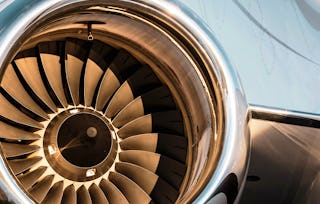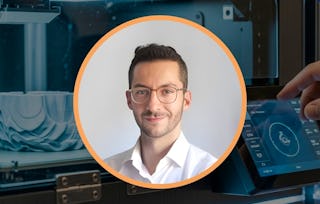The online course Digitalisation in Aerospace aims at making you aware of special production requirements connected with digitalisation. You will learn about the role of robotics and automation in manufacturing and gain a better understanding of differing perspectives on research and manufacturing as well as the points where these intersect.

Digitalisation in the Aerospace Industry

Digitalisation in the Aerospace Industry
This course is part of Digitalisation in Aeronautics and Space Specialization


Instructors: Klaus Drechsler
13,952 already enrolled
Included with
277 reviews
What you'll learn
You will comprehend the ways in which industry and research interact.
You will recognise the special requirements resulting from digitalisation in production and industrial manufacturing.
At the end of this course you will be familiar with the most relevant digital applications in aerospace research.
You will be able to discuss examples of the utilisation of these technologies.
Skills you'll gain
Details to know

Add to your LinkedIn profile
See how employees at top companies are mastering in-demand skills

Build your subject-matter expertise
- Learn new concepts from industry experts
- Gain a foundational understanding of a subject or tool
- Develop job-relevant skills with hands-on projects
- Earn a shareable career certificate

There are 4 modules in this course
This course unit is a brief introduction to the history of aerospace, discussing the digital evolution of this research area from the earliest days up to the present. Lecturer: Professor Manfred Broy (Zentrum Digitalisierung.Bayern)
What's included
3 videos4 readings
The online course unit "Digitalisation in Production" provides an initial insight into how digitalisation influences production. It provides an overview of what digitalisation is before discussing four aspects of digitalisation and their concrete impact on production technology. In addition to cyber-physical systems (CPS) and digital twins, assistance systems and robotics in production are examined in greater detail. For all modules, examples are given of how use of these technologies is already changing or will change production processes, especially in the field of aerospace. - Lecturers: Professor Gunther Reinhart (Technical University Munich & Fraunhofer Research Institution) & Professor Klaus Drechsler (Technical University Munich & Fraunhofer Research Institution).
What's included
6 videos1 reading5 assignments
Workload is the amount of work an individual has to perform. Actual amount of work vs the individual’s perception of workload has to be considered. Assessment of operator workload has a vital impact on the design of man-machine systems. Occupational or work-related stress is the response humans may experience when presented with work demands and pressures that are not matched to their knowledge and abilities and challenge their ability to cope, potentially resulting in inefficiencies, inadequate man-machine cooperation and human error. Avoiding workload imbalance and occupational stress increases efficiency, reliability and the safety of complex systems, supporting the attainment of mission objectives in the process. The ways in which digitised companies operate will be changing radically. The company of the future will use digital means to manage its central functions such as its organisational structure and value creation. Future leaders will need to understand not only their “generation smartphone plus”-employees, but will also have to accept non-human factors such as AI algorithms and robots as part of a team. In such a radically changed environment with teams incorporating human and artificial intelligence, general mental models have to be developed for the workings of an organization, the products of the future and the requirements of the market and customers. - Lecturer: Professor Harald Schaub (IABG Ottobrunn & Otto-Friedrich-University Bamberg).
What's included
3 videos2 assignments3 discussion prompts
In this course unit, Professor Mendler presents on the individual steps in the approval process for new aircraft under European and international requirements as well as on relevant maintenance processes and the impact of digitalisation in this area. - Lecturer: Professor Josef Mendler (IABG Ottobrunn).
What's included
5 videos2 readings5 assignments1 peer review
Earn a career certificate
Add this credential to your LinkedIn profile, resume, or CV. Share it on social media and in your performance review.
Instructors

Offered by
Explore more from Mechanical Engineering
 Status: Free Trial
Status: Free TrialTechnical University of Munich (TUM)
 Status: Free Trial
Status: Free TrialTechnical University of Munich (TUM)
 Status: Free Trial
Status: Free TrialTechnical University of Munich (TUM)
 Status: Preview
Status: Preview
Why people choose Coursera for their career

Felipe M.

Jennifer J.

Larry W.

Chaitanya A.
Learner reviews
- 5 stars
76.53%
- 4 stars
16.60%
- 3 stars
4.33%
- 2 stars
0.72%
- 1 star
1.80%
Showing 3 of 277
Reviewed on Aug 3, 2021
Very insightful course. Totally worth the time. Excited to see the other two courses.
Reviewed on May 22, 2022
This was an amazing course. I learned so much! Can't wait to learn more! --John
Reviewed on Jan 10, 2021
Very informative and guided to the world of digitalisation.

Open new doors with Coursera Plus
Unlimited access to 10,000+ world-class courses, hands-on projects, and job-ready certificate programs - all included in your subscription
Advance your career with an online degree
Earn a degree from world-class universities - 100% online
Join over 3,400 global companies that choose Coursera for Business
Upskill your employees to excel in the digital economy
Frequently asked questions
To access the course materials, assignments and to earn a Certificate, you will need to purchase the Certificate experience when you enroll in a course. You can try a Free Trial instead, or apply for Financial Aid. The course may offer 'Full Course, No Certificate' instead. This option lets you see all course materials, submit required assessments, and get a final grade. This also means that you will not be able to purchase a Certificate experience.
When you enroll in the course, you get access to all of the courses in the Specialization, and you earn a certificate when you complete the work. Your electronic Certificate will be added to your Accomplishments page - from there, you can print your Certificate or add it to your LinkedIn profile.
Yes. In select learning programs, you can apply for financial aid or a scholarship if you can’t afford the enrollment fee. If fin aid or scholarship is available for your learning program selection, you’ll find a link to apply on the description page.
More questions
Financial aid available,
¹ Some assignments in this course are AI-graded. For these assignments, your data will be used in accordance with Coursera's Privacy Notice.

